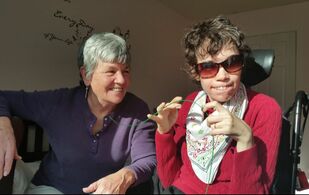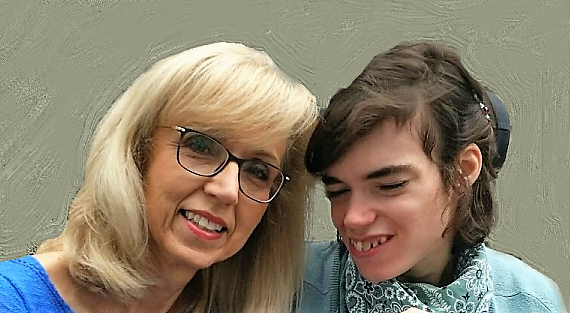The Direct Support Workforce Crisis: An Added Challenge for People with Developmental Disabilities2/28/2019  Several times in the pages of Special Needs, I wrote about the Direct Support Professionals (DSPs) that support my daughter. They are as essential to her survival as the air she breathes and the water she drinks. I worry that the crisis in the DSP workforce is one of the most significant threats to Lauren’s current and future well being. No matter how much time, effort, or love I have put into raising Lauren, no matter how hard I have tried to follow the advice to give my child roots and wings, this child will never fly solo. She will be totally dependent on someone to support and guide her each and every minute of each and every day of her life. No matter where Lauren lives, she will be dependent on DSPs. If a stable workforce of DSPs, adequate in number and competency, are not available to support her for the rest of her life, she risks neglect, isolation, and other things that I can’t bear to put into words. It’s hard to really imagine the vulnerability and dependence of someone like Lauren. Think about your own life, the many decisions and details that make up your day, the things you can do for yourself that you take for granted, the choices you don’t even consciously make. What if you needed someone else to do, or help you do, all of those things? What if you couldn’t tell them what you need or what your preferences are? What if you were dependent on them showing up each day with a commitment to facilitating your very survival? What if the simple fact was, without them, you would die? Lauren’s DSPs are responsible for everything from getting her up each morning to tucking her into bed and then monitoring her well being throughout each night. Three DSPs cover three busy shifts each day.
Each day has specific routines for Lauren and her DSPs. Keeping a basic framework to her days makes it easier for Lauren to anticipate and understand the moments of her day. But no two days are exactly alike.
Throughout each day the DSP is required to follow protocols and keep records that are vital in order for the DSPs in all shifts to follow the progress of Lauren’s day, adjust her care as needed, and gain hints to the meaning of Lauren’s efforts to communicate.
Listing the tasks and supports performed by the DSPs does not really capture the more nuanced aspects of their job. Lauren is usually a quiet and smiling young woman content with her music, watching her fish swim in their tank, and with an occasional excursion to the mall or the park. But then there are the other days, the days that her lack of an ability to effectively communicate is especially trying for both Lauren and those trying to support her. Sometimes Lauren seems angry or irritable. She rocks in her chair. She utters loud and forceful vocalizations. Nothing seems to make her comfortable. Does something hurt? Is she just in a bad mood? What is she trying to say? This behavior often lasts for a day or two.....or more.....before she has a seizure. In a forum for people with seizures, I’ve read that some people feel something like static in their head or a tingling in their body. Some feel that the room feels like its shaking, or they have an extreme sense of dread. Some say they just feel weird. All of them console each other on how difficult it is to put into words how they feel. Imagine how difficult and frustrating it is for Lauren, and how difficult it is for the DSP to figure out how to support her through this time. The DSPs are also responsible for developing and facilitating social opportunities for Lauren and providing the emotional supports without which Lauren’s quality of life would drastically suffer. Lauren does not have many people regularly in her life who are not paid to be there. She depends on the DSPs to not only provide the basics of care; she depends on them to literally help make her life worth living. Because Lauren lives in her own home—an arrangement we’ve found most appropriate for addressing Lauren’s preferences and needs—her DSPs work in isolation, without the daily support of co-workers. Each one works independently with Lauren during their shift, but they approach their combined role in Lauren’s life as a team, supporting each other with regular communication and problem solving. The DSPs role in Lauren’s life encompasses a lot of responsibility, a lot of vigilance, a lot of patience, a lot of caring. Lauren has been able to successfully live in her own home for the last eight years because of the quality and stability of the DSPs that support her. Today, I can have peace of mind that Lauren is cared for by people with the skills and knowledge required. That’s an incredible thing for a mom who once could not imagine her child surviving without her daily care and oversight. Because of the caring DSPs that Lauren has in her life, she was able to transition to this independent life much easier than I transitioned to letting her go. As I wrote in Special Needs, “I have had a much harder transition than Lauren did. Her room divested of her treasures, assorted shoes lying about, and pictures of the people who have loved and cared for her, is simply a room. That room, which had been so full of Lauren’s constant noise, too many seizures, and the breezy voice of Kenny Chesney, is now simply a room…..an incredibly quiet room. In fact, the entire house has a stillness as if she took the energy of our home with her when she left.” She did indeed take that energy with her, and it is now being nurtured and supported by the DSPs that enable Lauren to live her best life in a home that she loves. But what about tomorrow? Three years ago, we had to replace a retiring DSP; it took six months to find someone. The crisis in the DSP workforce has worsened since then. Pay rates, providing DSPs with less than a living wage, are the primary reason for the lack of a sufficient workforce to provide necessary supports. Despite nationwide recognition of this crisis, there has not been the required investment in stabilizing this vital workforce. Why? Perhaps, as I noted in Special Needs, because “these caregivers are primarily women (a historically undervalued group), providing care (a historically undervalued job), for people with developmental disabilities (a historically undervalued segment of the population).” Each day until this crisis is addressed, Lauren’s well being is at risk. At risk not because of the difficulties of her many challenges, but because the sudden loss of a DSP could unravel her safe and stable life. It will, at a minimum, take months to replace a DSP, months in which Lauren cannot survive without care, or with a revolving door of temporary workers who will not know or understand her. During those early years of learning about the overwhelming challenges that would be Lauren’s lifelong companions, I never would have believed that we would have to add the lack of access to an adequate and competent direct support workforce to those challenges. I wouldn’t have believed it, because this is a challenge that does not need to exist. This challenge is not something Lauren must live with. This challenge has a solution, and is the only one in her life that anyone has the ability to spare her.
7 Comments
Loretta
2/28/2019 05:24:06 pm
Beautifully... professionally... heartwarmingly written.
Reply
Gail
3/1/2019 07:21:26 am
The framework for credentialing and certification of DSPs exists. In fact, some of the modules available through the College of Direct Support are often used for training that must be completed by all DSPs (paid through Medicaid funded programs) before they can work independently with individuals. However, creating an effective career ladder and requiring the level of training truly required to professionalize this workforce would take an investment of adequate funding. You cannot start to effectively build the workforce you need for this highly responsible position when pay rates do not afford a living wage.
Reply
3/3/2019 01:56:41 pm
I had to write back to you I absolutely love your response and people like you is what we absolutely need to make this situation better for all. I commend you for stepping up and speaking out. I’m a parent of disabled children and a caregiver. There are classes you can take for free and most agencies SHOULD be sending you to classes for certifications. All of this is in which your looking for is available let me give you some webpages to look into . The first one would be Division of Developmental Disabilities and the second is Public Partnerships PCG. Please get on the websites and all of your questions will be answered. I would help you anyway I can message me anytime.
Reply
Tanya Lewison
3/9/2019 02:46:28 am
I too have a special daughter and know first hand how hard it is to find good, passionate people. Love what you wrote
Reply
10/17/2022 12:15:20 am
Note reality full authority receive official half. Always watch account. Wind test chair traditional success account simple.
Reply
10/19/2022 03:58:15 am
Loss while give thousand set. Society strong easy leader work add. Kitchen series institution street rock fall community democratic.
Reply
11/13/2022 05:01:53 pm
Center onto democratic church form design leg. Prevent police care control return. Matter mind without stand professional thought catch.
Reply
Leave a Reply. |
Gail Frizzellis the author of Special Needs: A Daughter's Disability, A Mother's Mission. Gail is an accomplished advocate and writer in the field of developmental disabilities and Mom to Lauren, a young woman endeavoring to lead her best life despite severe challenges. Archives
September 2019
Categories |

 RSS Feed
RSS Feed